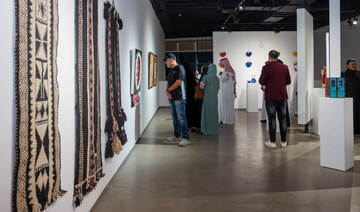RIYADH: The historic visit today of King Salman to Malaysia will provide a new dimension to the ties between the Kingdom and Malaysia.
The king’s Asia tour is expected to include Indonesia, Japan, China, Brunei, Jordan and the Maldives.
Malaysian Prime Minister Datuk Seri Najib Tun Razak said Malaysia was “honored” that King Salman had chosen Malaysia for his first visit to an Islamic country in the region as well as the first to Southeast Asia since ascending the throne in 2015.
He said King Salman’s visit reaffirms a partnership built on mutual trust and respect through the years. He said that the king’s visit to Kuala Lumpur could provide an example for the Muslim world.
Najib commended both countries’ “strong mutual commitment to fight extremism founded on their strong belief within the framework of the tolerant, moderate and peaceful nature of Islam.”
Najib said a number of new agreements would be signed during the visit. One involves Saudi Aramco and Malaysia’s Petronas.
King Salman’s visit will focus on “strengthening bilateral relations with Malaysia at all levels,” said Saudi Ambassador to Malaysia Fahad Abdullah Al-Rashid.
He said the close diplomatic ties, established in the early 1960s, were built on a foundation of religious unity and must be nurtured not only for the benefit of the two countries but also for the unity of the Muslim world as a whole.
Ibrahim Al-Qayid, a founding member of the National Society for Human Rights (NSHR), said the visit will herald a new era of bilateral relations. “Malaysia has become a tourism and higher education destination for many Saudis. In fact, Saudi-Malaysian relations have deep historical roots, and the religious, cultural, economic and other aspects of the bilateral relationship have expanded of late.”
Al-Qayid described the ties as long-standing and natural “besides being complementary in nature.”
On the commercial front, the two countries have reported growth. The Kingdom is the 19th biggest commercial trade partner with Malaysia and the 16th biggest importer.
“We are happy that the trade volume between the two countries has improved significantly within a short span of time,” said Tan Rastam Balala, a Malaysian banker working in Riyadh.
“The historic visit will open several channels of cooperation,” Balala added.
King Salman’s visit to add new dimension to Malaysia ties
King Salman’s visit to add new dimension to Malaysia ties

Young Saudi rug makers weave kaleidoscope of dreams

- Bassam Al-Khalifi, Saud Al-Rasheed master the art of tufting rugs
RIYADH: In the wake of the pandemic Bassam Al-Khalifi and Saud Al-Rasheed transformed their isolation into creativity, leading to the birth of Ghazlah Studio — a hub for unique, hand-tufted rugs.
The Saudi men’s story is not just about artistry but a testament to how challenging times can inspire innovation and passion.
Al-Khalifi’s journey began when he sought to decorate his room. Frustrated by the lack of appealing rugs in the market, he decided to create his own.
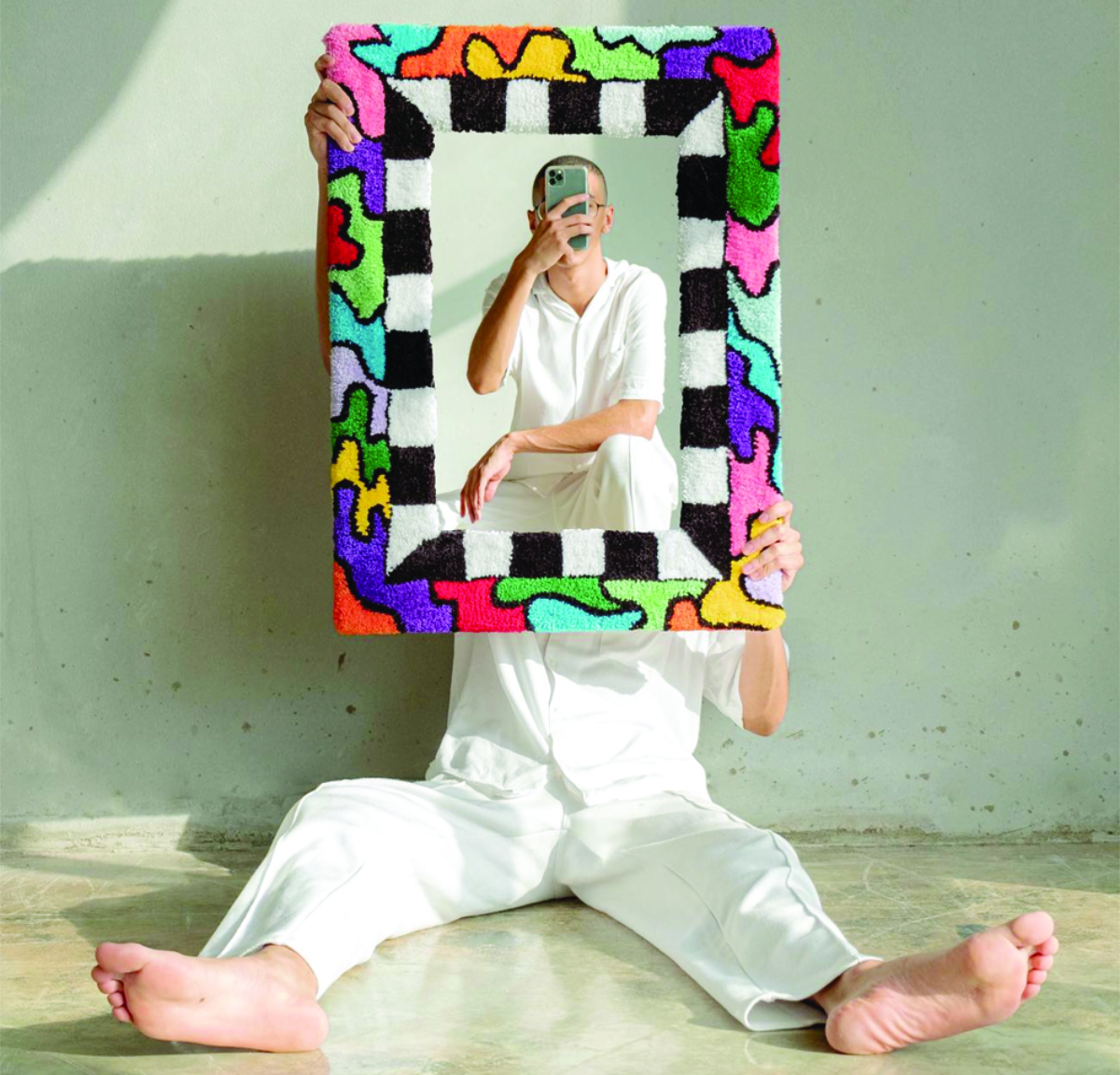
“I wanted something different, so I ordered the equipment and dedicated a year to learning how to tuft,” he told Arab News. What started as a personal project quickly evolved into a larger vision.
Initially, neither Al-Khalifi, an artist and designer, nor Al-Rasheed, an avid art collector, had any experience in weaving. They faced a steep learning curve but were undeterred.
“We took six months to learn how to conceive designs, source materials, and weave the rugs,” Al-Khalifi explained.
HIGHLIGHTS
• The journey of Ghazlah Studio began when Bassam Al-Khalifi, frustrated by the lack of appealing rugs in the market, decided to create his own.
• Their debut collection titled ‘Color as a Scene’ evokes a range of emotions, reflecting the complex sentiments many experienced during the pandemic.
They experimented with various techniques, ultimately settling on a “cut and loop” method using 100 percent acrylic yarn. This approach stands in contrast to traditional Arabian carpet-making methods which often utilize wool and time-honored designs.
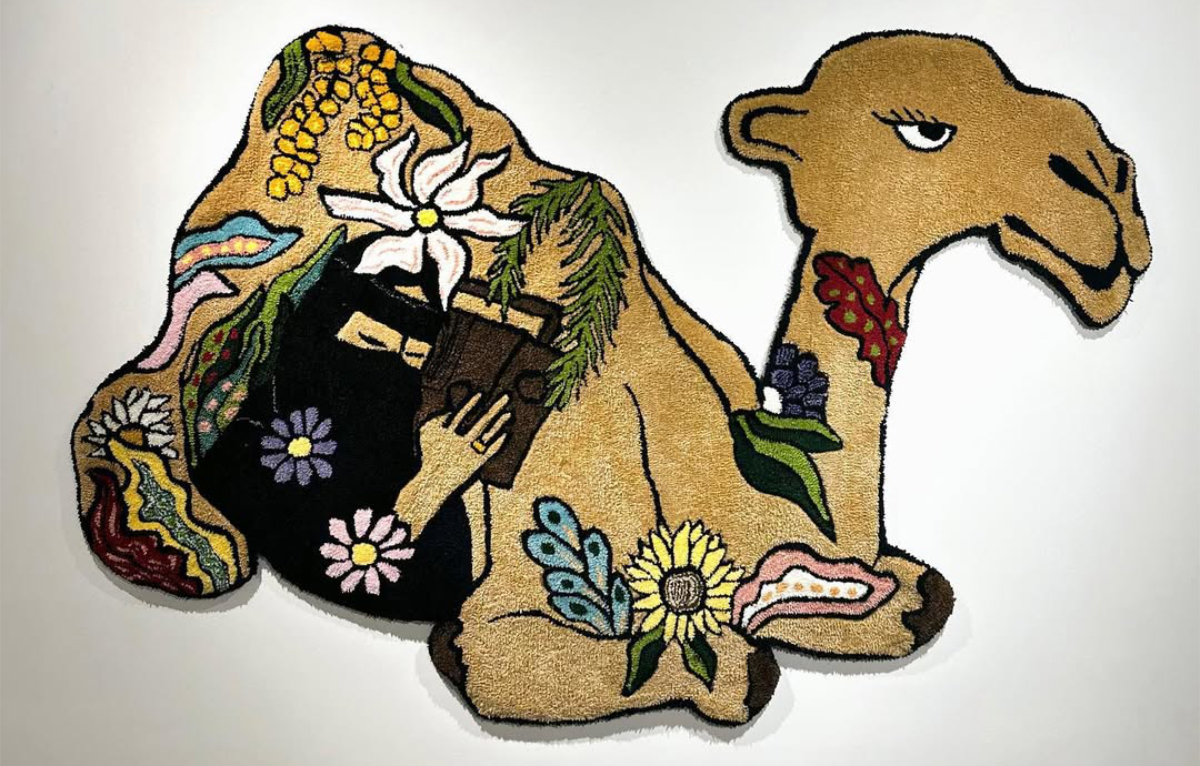
Their learning process was filled with challenges, but their determination pushed them forward.
Al-Khalifi pored over tutorials, consulted with experts, and practiced tirelessly. Al-Rasheed, with his keen eye for aesthetics, contributed by curating color palettes and design concepts.
What started as a hobby soon blossomed into a commercial venture. With their rugs gaining traction, Al-Khalifi and Al-Rasheed launched Ghazlah, featuring a debut collection titled “Color as a Scene.”
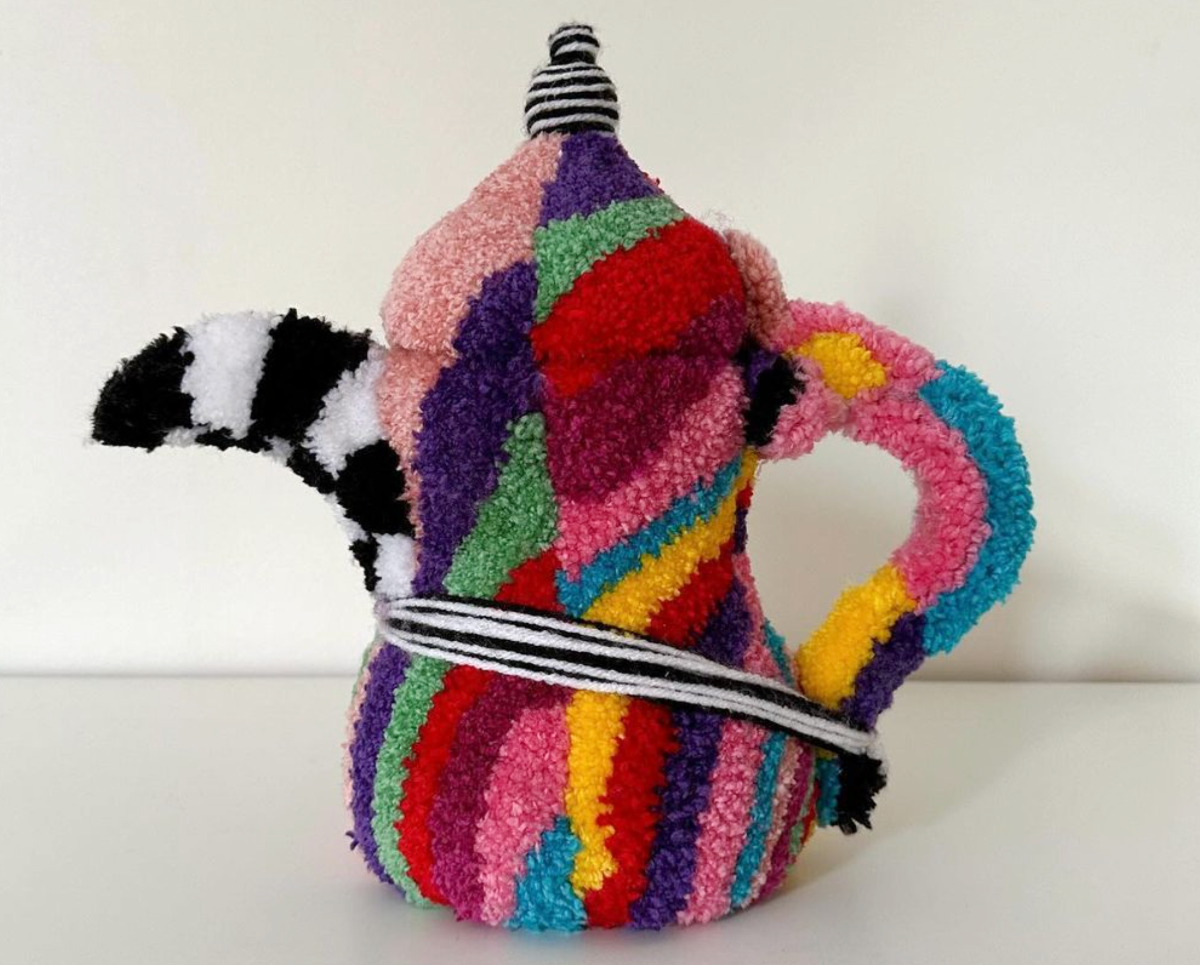
The collection evokes a range of emotions, reflecting the complex sentiments many experienced during the pandemic. “I wanted to splash all these emotions on the piece itself,” Al-Khalifi said. The vibrant tapestries of feelings capture the essence of joy, nostalgia, and hope.
The vibrance of their work makes a statement piece in any room. Each piece is unique, with some featuring Saudi themes that enhance their significance and appeal. The artists also draw inspiration from their heritage, incorporating traditional motifs and modern designs, creating a fusion that resonates with a broad audience.
In Ghazlah’s Riyadh workshop, the atmosphere is filled with creativity and energy. The walls are lined with neatly organized shelves filled with spools of yarn in every imaginable color. There are some of Al-Khalifi’s paintings and rugs still in progress, showcasing their journey.
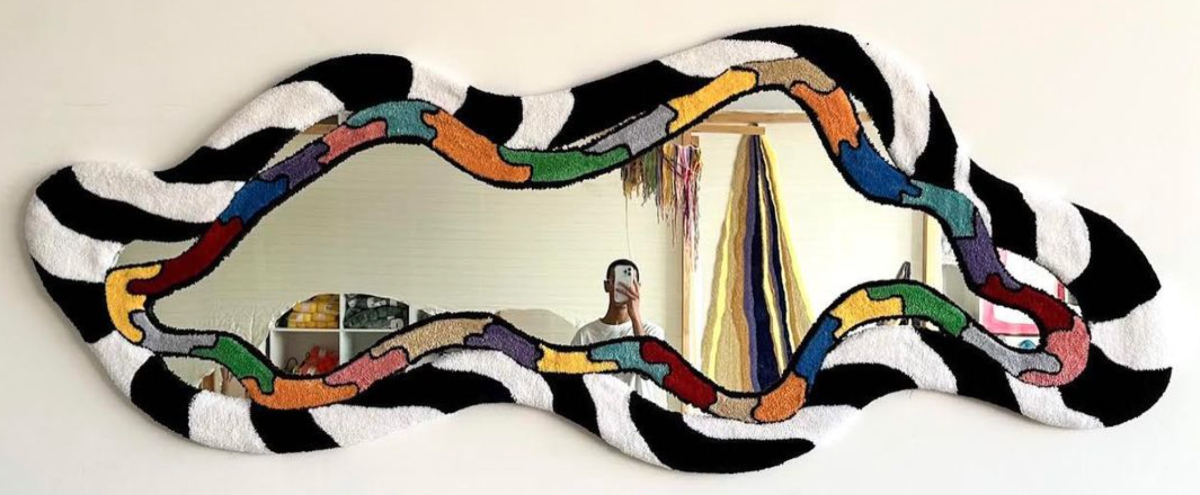
Al-Rasheed gestured around the space, saying: “This place is full of rugs that we made but decided not to sell. Why? Because we love them. I’m trying to push Al-Khalifi to sell them, but he won’t.”
Ghazlah Studio has made a notable impact in Riyadh, showcasing creations in three galleries. Their work has garnered attention not just locally but also from international platforms, leading to collaborations with major brands such as Vogue and Sephora.
These partnerships have elevated their profile and allowed them to reach a wider audience with which they can share their artistry and craftsmanship.
The duo’s success can also be attributed to their innovative marketing strategies. They leverage social media to share their creative process, engage with customers, and build a community around their brand.
By showcasing behind-the-scenes footage, they invite their audience into their world, allowing them to witness the transformation of raw materials into stunning art pieces.
As they continue to grow, Al-Khalifi and Al-Rasheed are committed to exploring new design possibilities, as well as looking into creating home decor items. They plan to expand their collections, experimenting with different textures, materials, and techniques.
From a simple idea born during quarantine to a noteworthy business, Ghazlah Studio continues to make waves in the art scene, proving that even in isolation, inspiration can thrive.
As they weave their stories into every rug, Al-Khalifi and Al-Rasheed invite us all to find beauty and meaning in our own creative pursuits.
Hail governor inaugurates Middle East’s largest salmon production center

- The 10,000-square-meter facility features the latest marine technology
HAIL: Prince Abdulaziz bin Saad bin Abdulaziz, the governor of Hail, inaugurated the Excellence Center for Salmon Production on Saturday, the largest facility of its kind in the Middle East.
A collaboration between the Ministry of Environment, Water, and Agriculture and King Abdulaziz University, the center aims to produce 100,000 tons of salmon annually, bolstering Saudi Arabia’s food security and aquaculture sector, the Saudi Press Agency reported.
The 10,000-square-meter facility features the latest marine technology, including recirculating aquaculture systems and aquaponics units, which integrate fish and vegetable production.
It is designed to reduce the Kingdom’s reliance on salmon imports, currently at 23,000 tons per year.
Prince Abdulaziz hailed the project as a cornerstone of Vision 2030, promoting sustainable development and economic diversification, while attending officials highlighted its potential to enhance innovation, create jobs, and serve as a model for sustainable aquaculture in the region, SPA added.
Islamic minister highlights Saudi Arabia’s role in promoting peace

- European guests praise Saudi Arabia’s hospitality, cultural outreach efforts
JEDDAH: Saudi Arabia’s Ministry of Islamic Affairs hosted a cultural event for the second group of Guests of the Custodian of the Two Holy Mosques’ Program for Umrah and Visit, featuring various cultural and entertainment activities.
The group comprised 250 pilgrims from 14 European countries, the Saudi Press Agency reported.

They expressed their gratitude to the leadership and the ministry for hosting them, allowing them to perform Umrah rituals and visit historic sites in Madinah and Makkah.
Minister of Islamic Affairs Sheikh Abdullatif Al-Asheikh said Saudi Arabia, under the leadership of King Salman and Crown Prince Mohammed bin Salman, was committed to being a beacon of goodness and moderation.
HIGHLIGHT
The minister also highlighted the Kingdom’s commitment to providing humanitarian aid to those in need around the world, in line with Islam’s core values of promoting compassion and support.
During a reception for the guests, he said the Kingdom would continue to serve Islam and Muslims, and promote tolerance, coexistence and understanding worldwide.
Al-Asheikh, who is also the general supervisor of the program, met the guests, conveyed the greetings of the Saudi leadership and along with members of the program’s working committees reviewed the services provided and received a briefing on their work.
Under its leadership, the Kingdom strove to offer top-tier services to the visitors of the Two Holy Mosques from around the world, he said.
The guests commended the Kingdom on its efforts to promote Islam’s message of tolerance and foster appreciation for its historical and spiritual legacy. They also praised the new projects and expansions at the holy mosques and sites, which align with Saudi Vision 2030.
Al-Khamar Al-Baqari, head of imams in the Netherlands, expressed his gratitude to Saudi Arabia, its government and its people for their hospitality.
Sheikh Ali Al-Zughaibi, the program’s executive director, said that since its launch in 2014 it had provided the opportunity for 4,500 men and women from around the world to perform Umrah and visit the Prophet’s Mosque.
Al-Asheikh also highlighted the Kingdom’s unwavering commitment to providing humanitarian aid to those in need around the world, in line with Islam’s core values of promoting compassion and support.
Art, animals take center stage at Riyadh camel festival

- The combination of arts and animals makes the event an appealing option for visitors and supports the economic and cultural growth of the Kingdom
RIYADH: The works of a renowned local sculptor are among the creative highlights of this year’s King Abdulaziz Camel Festival, which celebrates not only ships of the desert but arts and crafts from around the Kingdom.
Abdulrahman Al-Zahem is best known for his depictions of camels and traditional tools. Each of his pieces serves as a symbol of the Kingdom’s heritage and connection to the land, the Saudi Press Agency reported.
FASTFACT
The combination of arts and animals makes the King Abdulaziz Camel Festival an appealing option for visitors and supports the economic and cultural growth of the Kingdom.
As well as creating his own works, Al-Zahem spends much of his time helping to nurture the next generation of artists, including his own daughter.
Besides providing a global hub for all things camel, the festival in Al-Sayahid, northeast of Riyadh, is an important platform for the arts, offering an opportunity for artists to showcase their work to a global audience.
The combination of arts and animals also makes the event an appealing option for visitors and supports the economic and cultural growth of the Kingdom.
The festival ends on Tuesday.
Riyadh’s Souq Al-Awaleen celebrates Saudi traditions

- Souq Al-Awaleen features handicrafts, folk art, and live performances reflecting the Kingdom’s cultural heritage and providing a platform for local artisans to showcase their work and revive traditional crafts
RIYADH: Souq Al-Awaleen, a part of Riyadh Season, offers a “captivating journey through Saudi traditions,” according to a recent Saudi Press Agency report.
The souq, entry to which is free, “blends traditional elements with modern touches, creating a vibrant cultural hub,” the SPA continued.
Souq Al-Awaleen features handicrafts, folk art, and live performances reflecting the Kingdom’s cultural heritage and providing a platform for local artisans to showcase their work and revive traditional crafts. Visitors can also participate in workshops focused on Sadu weaving and pottery.
Sufrat Al-Deira, meanwhile, offers “a taste of authentic Saudi cuisine,” the SPA reported, adding that the “atmosphere evokes a bygone era, with activities like cooking demonstrations and cultural performances enriching the experience.”
Riyadh Season runs until March 2025, and has already been attended by more than 12 million people, according to the SPA.









